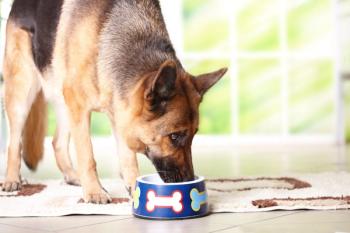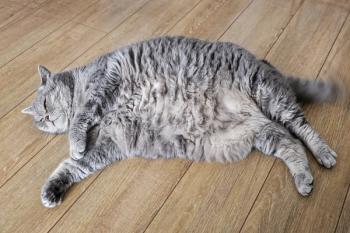
Take steps to becoming an outpatient nutritional advisor
Nurtured means they know the desired outcome and accept the accountability for getting there with the client and patient...
Clients are practiced observers; they do not know the inner secrets and terminology of the science and technology of veterinary medicine. They only know what they see in the caring, sharing and pride of the practice staff.
Suggested reading
My goal for this article is to address "selling pet food," and the best management approach to achieve success. While the simple approach would be to do what I was asked, that is seldom my consulting style; it is far more important to me to set the stage for what should happen.
The only thing we sell to clients in a quality-based companion animal veterinary practice is peace of mind; all else they are allowed to buy.
We have written in many sources that the outpatient nurse technician is responsible for escorting the client/patient into the consultation room, completing an asymmetry exam including the TPR, dental score, body condition score and parasite protection screening history (+/- conducting the interviews required for baseline client and patient information), doing the history review of the client's concern, and providing the delivery of healthcare information as directed by the veterinary practice's standards of care.
The skilled nurse technician also provides whatever else the client may need (pet parent awareness training). The staff members must act as a caring friend to the client and have genuine concern for the companion animal (patient advocacy = speaking for the pet's "needs"). Nurse technicians must always act, dress and look like a member of a superior healthcare delivery team. They must always remember that they are "on stage" and that their actions, appearance and words are not missed by owners.
They are impressive, simply because they are friendly and they know "their stuff."
Remember: The goal for the outpatient nurse technician — to allow the consultation room encounters to go smoothly, to increase the doctor's productivity, and to give the client another healthcare provider to talk to in the consultation room and on the telephone.
- The mission
With the above philosophy, it must be obvious that we believe technicians are critical to effective veterinary healthcare delivery.
As we have said, many times, in many seminars, in many areas of this country and internationally, "...veterinarians are accountable for producing the gross, but it is the staff who can produce the net!
The effectiveness of the staff is directly proportional to the level of trust for which they have been trained. If they have not been trained to be trusted, or if the doctor corrects them in front of clients or other staff members, the health care delivery team system will be non-functional.
The concepts of practice operation stated herein are built upon the premise that the provider trusts the team, that training has occurred, and that the team members feel nurtured rather than controlled.
Nurtured means they know the desired outcome and accept the accountability for getting there with the client and patient; they operate in a harmonious "safe haven," with inviolate core values which decisions can be made.
They concurrently understand that the choice of process is theirs and the "boss" does not care as long as the philosophy of the practice, core values or standards of care, are not violated. Authority and responsibility are outdated terms on this healthcare team, since accountability for outcome means doing the right things for the right reasons at the right time. Doing things right was a training concern, not an operational control.
The measurements of success are the controls on this team: happy clients, harmony in the team and net income for the practice.
- Nutritional advisors
The goal for the outpatient nutritional advisor — to allow the pet parent to have a personal counselor in matters dealing with the nutritional health of their companion animal, and to give the client another healthcare provider to talk to in the consultation room and on the telephone.
We mentioned it above in passing, but let's get more specific: sequential weights are a necessity of quality healthcare delivery, and every weight will be followed by a body condition score (BCS). We use a nine-point scoring system to reduce decimal points in the computer tracking records (five is ideal), but any numbering system is adequate as long as it is consistent between everyone in the practice.
- Parameters of consultation
A few basic parameters must be part of the practice's standards of care. During the consultation, each nutritional need identified by the doctor will be assigned to the attending nurse and followed at a two to four-week interval.
The standard nutritional trial is eight to 12 weeks long, and includes laboratory blood chemistry and urinary surveillance before, during and after the trial.
The BCS is a method of communicating professional assessments, and will be used with every weight so the next person is fully aware of the provider's perceptions and client communications that occurred.
When we do consultations, or speak to veterinary teaching hospital students, we teach these new veterinary healthcare providers the core three secrets of client bonding (heard originally from Drs. Greg Ogilive and Kathy Mitchner when they were speaking on oncology):
Do not allow pain.
Do not allow puking (peeing and pooping are included here).
Tell the pet steward how/what to feed their companion animal.
It may not be rocket science, but most veterinary teaching hospitals seem to love to teach NPO (nothing per os/mouth).
Most veterinary teaching hospital curriculums still teach "small animal medicine and surgery"; the VTH awareness of "companion animals" and the role of "pet parents" seem minimal to non-existent (no wonder most operate at about a 50 percent loss).
The reality is simple; most every companion animal plays an important family role for the client accessing a veterinary hospital, and we can nurture that relationship or ignore it.
The third element of the triad above is the one we want to capitalize daily: Tell the pet parent how/what to feed their companion animal.
We now call the animal owner a "pet parent" as a response to the 2003 American Animal Hospital Association compliance study; to wit, most practices do not make the client aware of the urgency of care needed for their animals. If I recognize that most every pet owner gives their animal "family status" and one-third of those give them people status, then considering them a "pet parent" addresses two key compliance issues:
No one wants to be a compliance cop.
No client wants to be forced into an involuntary compliance situation.
When we introduce Pet Parent Awareness Training to address the perceived compliance issues, a special change occurs. Staff starts to nurture clients, and clients start to listen to staff.
Case in point: Paula was carrying a bag of therapeutic food forward to a cat owner, since the doctor had ordered kidney failure diet for the kitty. Paula stopped, looked at me, and said, "This is a dumb statement to make to a client, isn't it?" ... so she handed the bag of food to the client and said, "This is the kidney friendly diet the doctor asked us to give you for Cuddles, and as such, we need to schedule you back for the next set of kidney laboratory tests in three weeks. Do you want to make that appointment now, or should I call you when you get home and have your calendar handy?"
Yes, vendors have training programs for staff. Yes, a practice needs at least eight diet inventory turnovers a year due to the low line item net. Yes, we need outpatient nurse technicians calling clients before a reorder is needed, or we need to put the client on a home delivery program from companies like VetCentric or Iams (yes, home delivery has a duration of use about twice of a standard veterinary practice, just due to follow-up). Nutrition, not food sales, is the key to a practice's success.
Dr. Catanzaro was the first veterinarian to earn diplomate status in the American College of Healthcare Executives. In the past four years he has had 12 practice management-related texts published. Questions can be directed to Veterinary Practice Consultants (Catanzaro & Associates, Inc.), 18301 West Colfax Ave., Bldg. R101 Golden, CO 80401; (303) 277-9800; Fax (303) 277-9888; email:
Disclosure: None
When the eyes say one thing and the tongue another, a practiced observer relies on the language of the first.
–Ralph Waldo Emerson
Newsletter
From exam room tips to practice management insights, get trusted veterinary news delivered straight to your inbox—subscribe to dvm360.




